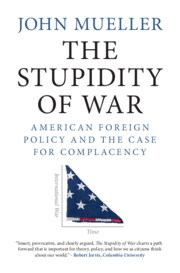Book contents
- The Stupidity of War
- The Stupidity of War
- Copyright page
- Dedication
- Contents
- Figures
- Acknowledgements
- Additional material
- Prologue The Rise of War Aversion and the Decline of International War
- Part I Assessing the Threat Record
- 1 Korea, Massive Extrapolation, Deterrence, and the Crisis Circus
- 2 Containment, Vietnam, and the Curious End of the Cold War
- 3 Military Intervention and the Continued Quest for Threat after the Cold War
- 4 Al-Qaeda and the 9/11 Wars in Afghanistan, Iraq, Pakistan
- 5 Chasing Terrorists Around the Globe and Other Post-9/11 Ventures
- Part II Evaluating Present Threats
- Afterword Aversion to International War as an Explanatory Variable
- Appendix: A Sardonic Litany
- Notes
- References
- Index
5 - Chasing Terrorists Around the Globe and Other Post-9/11 Ventures
from Part I - Assessing the Threat Record
Published online by Cambridge University Press: 01 March 2021
- The Stupidity of War
- The Stupidity of War
- Copyright page
- Dedication
- Contents
- Figures
- Acknowledgements
- Additional material
- Prologue The Rise of War Aversion and the Decline of International War
- Part I Assessing the Threat Record
- 1 Korea, Massive Extrapolation, Deterrence, and the Crisis Circus
- 2 Containment, Vietnam, and the Curious End of the Cold War
- 3 Military Intervention and the Continued Quest for Threat after the Cold War
- 4 Al-Qaeda and the 9/11 Wars in Afghanistan, Iraq, Pakistan
- 5 Chasing Terrorists Around the Globe and Other Post-9/11 Ventures
- Part II Evaluating Present Threats
- Afterword Aversion to International War as an Explanatory Variable
- Appendix: A Sardonic Litany
- Notes
- References
- Index
Summary
A definitional modification has had the effect of greatly magnifying the perceived importance and frequency of terrorism. The United States failed in its military interventions in Libya and in the Syrian civil war, both of which replaced coherent if unpleasant regimes with chaos and murderous disorder. There was, however, a successful campaign against Islamic State, or ISIS, or ISIL, an especially vicious, ultimately self-destructive, insurgent group that had a genius for making enemies and owed its initial successes in 2014 primarily to the often-monumental incompetence of the US-trained Iraqi army. However, as with al-Qaeda after 9/11, ISIS scarcely presented a challenge to global security, inspired near-total hostility in the area, and was soon pushed back. In defense and in decline, ISIS relied primarily not on counteroffensives, but on planting booby traps, using snipers, and cowering among civilians, and the costs for defeating it might have been lower if the methods to do so had been more measured. The strategy against ISIS worked because of a couple of features not likely to be found in many other conflicts: local forces were prepared to do the fighting and dying, and ISIS inspired existential angst in the US public.
- Type
- Chapter
- Information
- The Stupidity of WarAmerican Foreign Policy and the Case for Complacency, pp. 121 - 138Publisher: Cambridge University PressPrint publication year: 2021

